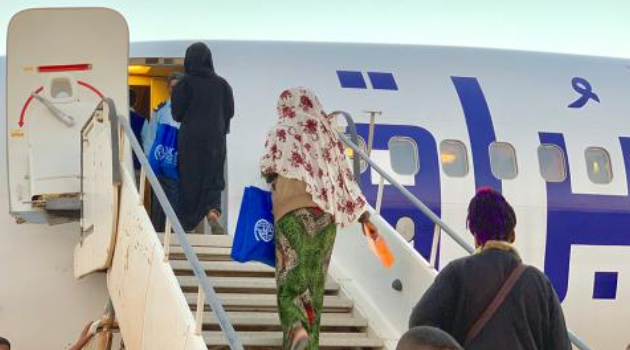Suspended for Two Years, IOM Resumes Voluntary Humanitarian Return Flights from Southern Libya
The UN Migration Agency, IOM, resumed its Voluntary Humanitarian Return Programme (VHR) in Libya’s southern city of Sebha last week.
VHR provides support to stranded migrants wishing to return to their home countries. In recent months, IOM has been expanding its outreach in the south through multiple field missions to make VHR operations possible.
The charter, which landed in Lagos, Nigeria, came after IOM’s outreach activities with local authorities and Nigerian communities in the south. In close coordination with the Nigerian Embassy in Tripoli, the Organization facilitated the provision of online consular support which enabled the embassy to conduct consular authentication and issue travel documents.
“We have been working intensively in the South to make sure that migrants living in urban settings or detention centres, who wish to return home safely, can receive our support,” said IOM VHR Operations Assistant, Mohamed Hmouzi.
The land transportation for migrants from BraK AL Shati and Sebha, located 80 kilometres and 30 kilometers – subsequently, from Tamanhent International Airport, was secured in collaboration with the local authorities. The migrants were also provided with food and non-food items. IOM provided protection screenings for vulnerable migrants and medical screening prior to their departure.
The charter carried 120 migrants (75 men, 30 women, 6 children and 9 infants) to Lagos. IOM will be working closely with the local authorities to ensure they reach all stranded migrants in the south who are interested in VHR assistance.
So far in 2018, IOM has provided voluntary humanitarian return assistance to a total of 14,622 migrants in Libya, out of which 3,503 were Nigerian migrants. Nigeria is the top country of return from Libya, followed by Mali and Niger.
IOM will continue monitoring and assessing the needs of stranded migrants in southern Libya for the provision of humanitarian assistance, VHR registration, medical care, as well as other pressing needs.
This charter was funded by the European Union Emergency Trust Fund for Africa.
(Source: IOM)





